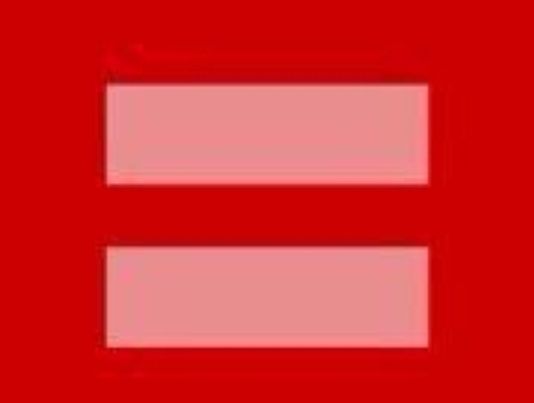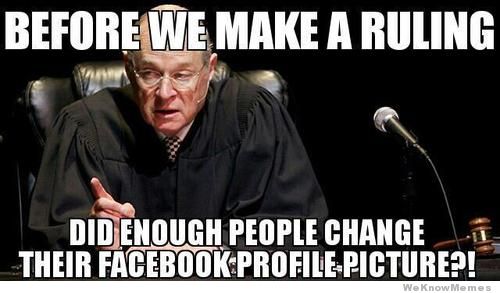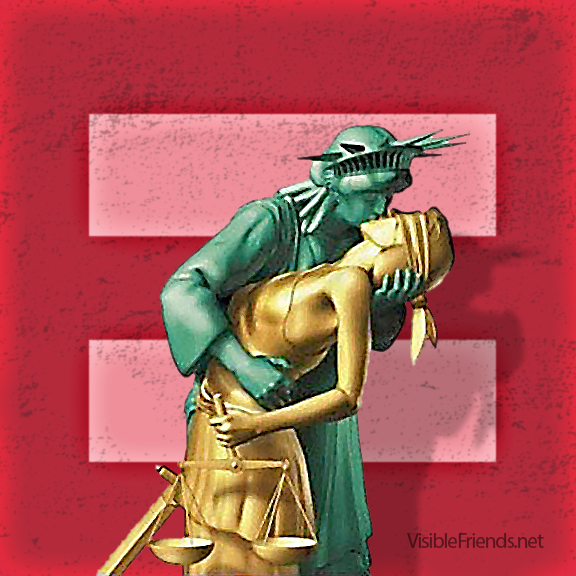Last week the Supreme Court of the United States (SCOTUS) heard arguments on landmark civil liberties cases with regards to same-sex marriage. On Tuesday, the courts took on California’s Proposition 8—a ban on same-sex marriage, and on Wednesday they heard arguments on the constitutionality of DOMA, a law that excludes same-sex couples from federal recognition. In light of these cases, I saw two interrelated trends in my Facebook newsfeed: profile pictures in the form of the red Human Rights Campaign (HRC) equality sign (headline photo), and snarky status updates making fun of these HRC profile pictures, accompanied by a note of support for marriage equality[i]. That is, although both groups shared and expressed the same opinion about same-sex marriage, they disagreed about the appropriate methods for showing this support. This disagreement highlights debates about political activism in the face of new technologies and brings us back to the question: Does slacktivism matter? I will argue here, as I have argued before that yes, it does.
The Critique: Profile Picture Change as Slacktivism
Slacktivism is a pejorative term that refers to a purportedly impotent form of political action in which a person engages within a digitally-defined space, and typically in a way that poses very few costs in terms of time, effort, and/or bodily risk. We can think here of signing and posting petitions, sharing news stories, spreading memes, and ranting on Twitter. These forms of political action have been criticized on two counts. First, detractors fear that slacktivism will replace “real” (read: physical/analog) forms of political action such as physical protest, phone calls, and letter writing. Slacktivism here is decried as congratulatory identity work, devoid of any real effect. Second, slacktivism is said to saturate the discursive political field, engulfing thoughtful voices and meaningful actions within a cacophonous din of noise.
Changing one’s profile picture in support of marriage equality is an almost Ideal-Type example of this phenomena called slacktivism. It requires very little time, effort, or bodily risk[ii]. It spreads not directly to political leaders, legislative actors, or mainstream journalists, but to one’s own network, who, as noted in footnote i, probably shares the same viewpoint anyway. Rather, changing one’s profile picture is an empty act, one that soothes the conscience, bolsters the image, and excuses the poster from true political engagement. It is, in the view of detractors, an act worthy of a giant eye-roll, as expressed—ironically—through status updates and memes.
In Defense: Why I Changed my Profile Picture
My profile picture last week was the simple red HRC equality sign. Let me tell you why I did this. In the course of telling you my reasons, I will defend so-called “slacktivism” more generally.
Solidarity: I have several LGBTQI friends, both within and outside of my Facebook network. As it is, the institution of marriage excludes them, and they therefore experience a dearth of civil liberties. This is not ok. Whether they want to marry or not, I want them to know that I care about their civic exclusion. My profile picture is a simple and efficient way to show this. From the privileged position of heterosexuality, changing my profile picture was a way to show that this is not just a gay/queer rights issue, this is a human rights issue, and we are all in this together.
Identity: Identity refers to how one sees the self, and how one acts in accordance. Who we are therefore both reflects and affects how we are. I am the kind of person who cares about human rights, and who is willing to engage in actions in line with such beliefs. My partner and I made the difficult decision several years ago not to get married until the institution of marriage ceased to be discriminatory (my mom is still displeased by this). This action, the decision to remain unmarried, is at the quintessential intersection of personal and political. No, our lack of marriage does not denigrate male-female couplings any more than it gives unmarried same-sex couples across the country legal parental rights over their shared children. It does, however, matter. Had I lived during Jim Crow, I would like to think that I would have boycotted segregated establishments, just as now I boycott exclusionary institutions.
Facebook is one way—among many— in which I represent myself. Social justice advocate is a strong part of my identity. It somehow felt disingenuous, flippant, and dismissive in the historical legal moment to signify myself with the image of my dog shying adorably away as I make kissy faces at him. Taking this a step further (or better yet, deeper), social actors come to know themselves by seeing what they do. One does not engage in political action and then, with a sigh of satisfaction and an audible “phew” wipe hir hands and excuse hirself from participation. This is not how identity works. Rather, s/he sees hirself engage in the act, interacts with others with regards to the act, and in however small a way, becomes the kind of person who engages in this sort of behavior. In this vein, the act of changing my profile picture, though small, further signified me as a supporter of equality. It not only reflects who I am, but further embeds this identity, which will guide future actions. In this way, I may have pushed myself into other forms of activism—just as all of those who changed their profile pictures, in so doing, showed themselves a little more about who they are.
Collective action and public discourse: I am only one person, and yet, my profile picture became a single drop within a larger sea of red. Within my network and across the country, newsfeeds were filling up with HRC symbols in support of marriage equality. I would be lying if I said I didn’t find it moving to scroll through my newsfeed as it became increasingly redder. In fact, it was this changing tide that first moved me to change my own picture. I realized that this was happening on a large scale, and that if it continued to do so, it would end up on the proverbial 6:00 news. Far from a separate space, dichotomized against mainstream news outlets, social media is both integrated with, and an impetus for, national news stories. Indeed, stories about the influx of HRC profile pictures were run on ABC, MSNBC, Fox, and many, many others. That is, the vast support for marriage equality, expressed via Facebook profile changes, became part of public discourse. Though a profile picture change is a small and quiet act, it was amplified through collective action and the interplay between personal and public media. I have argued before that memes are the myths of augmented society. In this way, small personal acts, connected to a larger movement, shared interpersonally and reported internationally, become part of the story that we tell ourselves, about ourselves. Such acts change, as I have argued before, the public zeitgeist—or feel— of the historical moment. Such a change can have real material implications, as seen most clearly in the examples earlier this year of SOPA and PIPA.
The week is over and my profile picture has returned to an innocuous dog picture. Come June, when SCOTUS renders decisions on the cases they heard this week, I imagine I will go back the HRC symbol (or whichever proliferates at the time). Well aware that my single act—a profile picture change—will be far from the force that legalizes same-sex marriage, it will be a force at a personal, interpersonal, and public level. Bring on the eye-rolls, I am more entranced by the sea of red than its cynical interruptions.

Follow Jenny on Twitter: @Jup83
[i] I also saw status updates in which my Friends talked about unFriending those who showed opposition to marriage equality. I did not, however, see any actual opposition within my own network. This is likely due to the fact that networks tend towards homophily (i.e. similarity of demographic characteristics and viewpoint), and I maintain—with a few exceptions—a very liberal network. Even those who are conservative tend to be the independent types who want government to butt out of everything, including matters of the family.
[ii] *edited 04/02/13 3:36pm* It does, however, require a degree of technical knowledge and skill, and the effort involved will vary based on level of technical knowledge and skill. Moreover, the risks involved vary with variations in the heterogeneity of one’s network, and the relative power relations of the user to hir network. Those with, say, homophobic bosses have very real and material risks associated with posting the image. As with most things, the socially vulnerable are at a disadvantage on each of these counts and assumptions about effortlessness and lack of risk are rooted in a privileged position




Comments 15
Atomic Geography — April 2, 2013
Other than the pejorative tone (maybe necessary to establish intelllectual bona fides)I thought the Morozov article you linked to had good ideas for designing web campaigns - that is he was not diminishing the usefulness of web based efforts over "real" efforts. His objection was to ineffective efforts. I think that's a fair concern.
http://neteffect.foreignpolicy.com/posts/2009/09/05/from_slacktivism_to_activism
David Banks — April 2, 2013
Great post Jenny! I was wondering though, if you had come across criticisms like this:
http://agnesgalore.tumblr.com/post/46709012222/why-i-almost-defriended-everyone-who-had-an-hrc-logo-as
Pertinent quote: "Folks, the HRC is an organization run by rich white men. They have consistently chosen not to support trans rights. They have consistently silenced POC organizations and organizers. They have accepted donations from, and even honored, multi-billionaire corporations who have done more than their fair share to contribute to the unequal distribution of wealth and to systematic racialized and gendered oppression in the US. Their vision of “equality”—as obviously signaled by their logo—is not, and never has been, equality for all. It is equality for those who can afford it."
At first i didn't think this was relevant to what you were describing because if you were to plug in something more inclusive than the HRC, you'd have the same phenomenon, but now I'm thinking of the same old questions of who has access to the kinds of media experts that can assure that a viral marketing campaign becomes successful. Obviously it is POSSIBLE for anyone to do it, but PROBABLE is another story. I suppose this really comes down to signs and symbols. If enough people are using the HRC logo and talking about POC queer and trans rights, is the HRC logo successfully being appropriated?
nathanjurgenson — April 2, 2013
wonderful post! i'm with you 99.9999%, especially on the digital dualism angle. funny how some people dont get upset over bumper stickers or yard signs but get angered by profile photo-changes or "likes". for some, i think, the bumper sticker stands in as a proxy for more direct political action, like voting, whereas the digital display is seen as separate from "the real world". ugh.
though, my .0001% disagreement is over your statement,
"Changing one’s profile picture in support of marriage equality is an almost Ideal-Type example of this phenomena called slacktivism. It requires very little time, effort, or bodily risk"
some folks might not have such homophilous networks, and such declarations might indeed be materially risky and dangerous. what's seen as low cost to many of us might lead to very real responses for those with bigoted networks (peers and authority figures) that can make life worse in very real ways such as through bullying, sanctions, etc.
koefoed — April 2, 2013
I agree that it does make a difference in the same way other protests or demos might make a difference. To me, however, it is interesting to ponder what this particular kind of demonstration/rally might mean in the context or platform where it takes place.
Unlike bumper stickers, yard signs or rallying in the streets, Facebook and Twitter are international platforms.
This raises a few questions or things to ponder, I think:
- does it mean that people in bigger countries or cultures like the US will have an easier or harder time protesting via profile pictures than people in smaller countries (say Denmark where I'm from)?
- what does it mean to the feeling of belonging, being part of a movement, if you're an internationally oriented person with many friends from another culture/country?
- what does it mean to people from other countries/cultures (again, let's take Denmark where I'm from) that they find it hard to navigate social media in the time the protest takes place because everyone has the same avatar? Or that they are perhaps seen as unsupportive even though the protest has nothing to do with them?
I'm very supportive of this particular case and have a hard time understanding why same-sex marriage is not already in effect (but I'm from a country that have had this for more than 20 years), but as I have many US friends /follow many Americans on Twitter, it struck me how social media are still very much local even if they support and contain lots of global connections.
Just a note, not a real questions, I guess.
(@koefoed on Tw)
jennydavis — April 2, 2013
Great point about the tension between local and global. However, I think the difficulty of navigation is part of the strength of the tactic. Although it may be more salient for Americans, I don't think it excludes the international community. In fact, wouldn't it be more powerful if participation was international?
QRG — April 2, 2013
Hi
I don't particularly support same sex marriage, or any kind of marriage. But on twitter I saw some comments from some trans people who said they have some real problems with the HRC in relation to lack of support for trans people.
I don't know anything about the politics here - I'm not even American!
But I think one needs to be careful when speaking of 'human rights' in terms of well, as you put it at #ttw13 (to paraphrase) 'Human rights, for whom?'
Friendly Fire: Vorwürfe gegen HRC-Kampagne - phenomenelle — April 13, 2013
[...] zieht, übersieht außerdem die Beweggründe vieler so Gescholtener, wie die Bloggerin Jenny Davis auf Cyberology [...]
Cables News is Dead, Long Live Cable News » Cyborgology — April 22, 2013
[...] I might want to express my feelings about it on Facebook. I might also want to sign a petition, change my profile picture in solidarity, and engage in vigilante justice. The news segments and interviews are cannon fodder for political [...]
Friday Roundup: April 12, 2013 » The Editors' Desk — April 1, 2014
[…] labor; Facebook friends are real friends; playing gender on Pinterest; and why the “Red Sea” of equality on social media is inspiring, if […]
Digital Technologies Drive Adjunct Labor Movements » Cyborgology | James Reads — March 24, 2015
[…] or contributing data may be do-able. I’ve written previously about the meaningful role of “slacktivism” in causing real change. In the case of contingent faculty, slacktivism is not only effective, […]